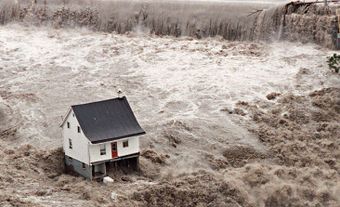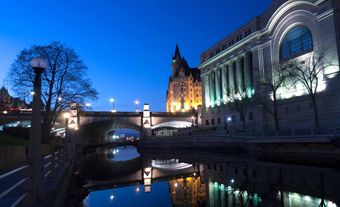Nova Scotia
Nova Scotia is Canada’s second-smallest province (following Prince Edward Island) and is located on the southeastern coast of the country. The province includes Cape Breton, a large island northeast of the mainland.
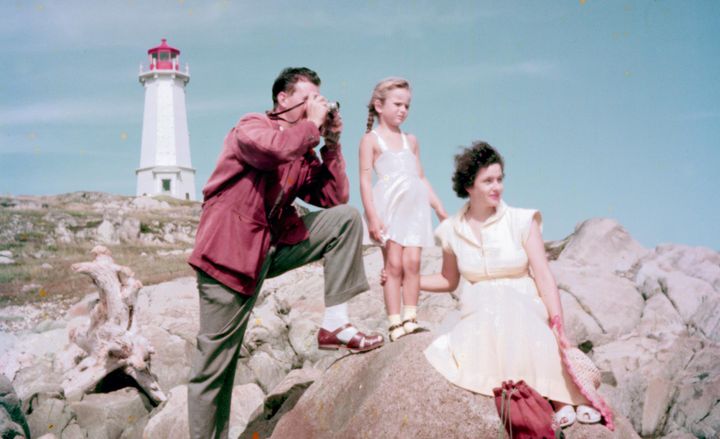
-
June 21, 1749
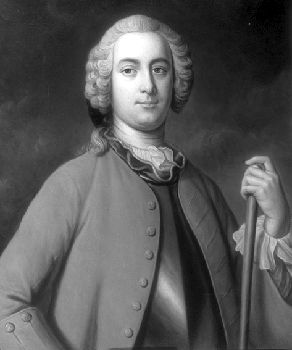
People
Founding of Halifax
Edward Cornwallis arrived in Chebucto harbour in advance of 2,567 settlers. Work began on the town of Halifax, which replaced Annapolis Royal as the capital of Nova Scotia and established a strong British foothold in Nova Scotia.
-
August 03, 1751
Communication and Transportation
First Printing Press
Bartholomew Green established the first printing press in Canada at Halifax.
-
March 23, 1752
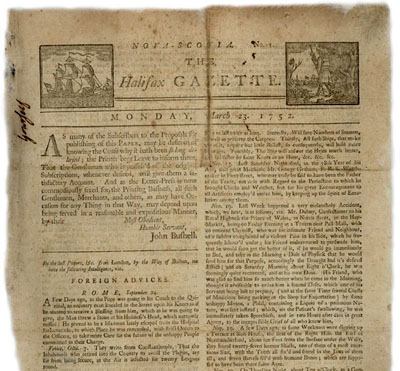
Communication and Transportation
Halifax Gazette Printed
Canada's first newspaper, the Halifax Gazette, was printed by John Bushell. He also published the first book in Canada on 6 December; it was an 8-page pamphlet for the government.
-
July 28, 1755

People
Expulsion of the Acadians
Between 1755 and 1763, approximately 10,000 Acadians are deported after delegates refuse to take an oath of allegiance to Britain. Acadians, the first French community in Canada, are allies of the Mi’kmaq and possess a distinctive culture. Following the Acadian Expulsion, thousands die of disease or starvation.
-
December 09, 1755
Communication and Transportation
First Post Office
The first post office in Canada was opened in Halifax.
-
October 02, 1758
People
First Elected Parliament
The legislative assembly of Nova Scotia convened at Halifax. It was the first legislature in any of the British North American colonies with a popularly elected House.
-
September 15, 1773
People
Arrival of the Hector
A group of Scottish highlanders followed a piper off the ship Hector to land at Pictou, NS. Their arrival marked the symbolic beginning of Scottish settlement in Canada, although earlier groups had previously settled in PEI.
-
January 01, 1776

People
Slaves and Free Persons Reach Nova Scotia
Canada developed a reputation as a safe haven for Blacks during the American Revolution, 1775-1783. The British promised land, freedom and rights to slaves and free Blacks in exchange for services rendered. Some of the Black Loyalists who reached Nova Scotia belonged to the "Company of Negroes" that had left Boston with British troops.
-
July 01, 1782
People
Enslaved Sylvia Defends Colonel Creighton
When Lunenburg, Nova Scotia was invaded by American soldiers, Colonel John Creighton's servant Sylvia rose to his defense. Sylvia shuttled cartridges in her apron from Creighton's house to the fort where he and his soldiers were engaged in battle. She also protected the Colonel's son and valuables.
-
September 03, 1783
People
Treaty of Paris 1783
This treaty ended the American Revolution, recognizing the independence of the American colonies. The boundary between British and American territories was set along the St. Lawrence River and through the Great Lakes. Post-war life in the United States was very difficult for British Loyalists, who endured property loss and discrimination. Many left and began to arrive in Nova Scotia, New Brunswick, Québec and Ontario. Famous migrant Loyalists include Lieutenant James Moody, Laura Secord and Richard Pierpoint.
-
January 01, 1784
People
David George
Baptist preacher David George was a Black Loyalist from Virginia. He settled in Shelburne, Nova Scotia in 1784 and began preaching in neighbouring Birchtown. His emotional sermons drew both Black and White Christians. Using only Black community funds, George founded several Black Baptist churches and initiated a "self-help" movement that still exists.
-
July 26, 1784
People
Canada's First Race-Riot Rocks Birchtown
After the Revolutionary War, the "Black Pioneers" were among the first settlers in Shelburne, Nova Scotia, and they helped build the new settlement. On its fringes they established their own community, "Birchtown." When hundreds of White, disbanded soldiers were forced to accept work at rates competitive with their Black neighbours the ensuing hostility caused a riot.
-
August 16, 1784
People
New Brunswick Separates
New Brunswick was established as a separate colony from Nova Scotia.
-
August 26, 1784
People
Cape Breton Island Made Colony
Cape Breton Island was made a separate colony from Nova Scotia.
-
September 11, 1784
People
St John I Rejoins Nova Scotia
Saint John Island (PEI) was reunited with Nova Scotia, though it retained a separate local government.
-
May 12, 1785
People
"Negro Frolicks" Prohibited
Officials in Nova Scotia ordered "50 Handbills [to] be immediately printed forbidding Negro Dances & Negro Frolicks in [the] town of Shelburne."
-
February 28, 1788
People
Land Grants for Black Loyalists
Governor John Parr approved a land grant at Birchtown, NS for Black Loyalist supporters of the British Crown. Of the 649 male Black Loyalists at Birchtown, only 184 received farms at all. The grant was made in recognition of the men’s service and fidelity to the Crown — often as soldiers — during the American War of Independence.
-
March 26, 1789
Sports and Culture
Pictou Academy Founded
A Nova Scotia statute established the Pictou Academy.
-
July 01, 1791
People
Slave Case Heard at Nova Scotia Court
Freedom for Black people was elusive, regardless of the promises made by the British at the end of the American War of Independence. Enslaved woman Mary Postell took her "owner," Jesse Gray, to court, twice, for stealing her children. He was found not guilty, even though he had sold her and her daughter.
-
January 15, 1792
People
The Black Loyalist Exodus
The difficulty of supporting themselves in the face of widespread discrimination convinced many Black Loyalists that they would never find true freedom and equality in Nova Scotia. When offered the opportunity to leave the colony in the 1790s, almost 1,200 Blacks left Halifax to relocate to Sierra Leone.
-
July 22, 1796
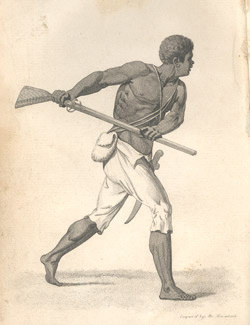
People
The Maroons Land at Halifax
A group of 600 freedom-fighters landed at Halifax. These immigrants, called Maroons, came from a Jamaican community of escaped slaves who had guarded their freedom for more than a century and fought off countless attempts to re-enslave them.
-
December 17, 1796
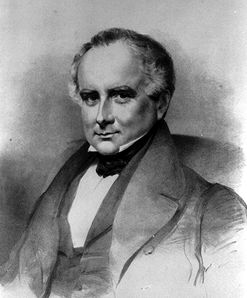
Sports and Culture
Birth of Thomas Haliburton
Author Thomas Chandler Haliburton, the first Canadian writer to gain an international reputation, was born at Windsor, NS.
-
January 03, 1802
People
Highlanders Settle Sydney
Three hundred Scottish Highlanders settled at Sydney, NS.
-
December 13, 1804
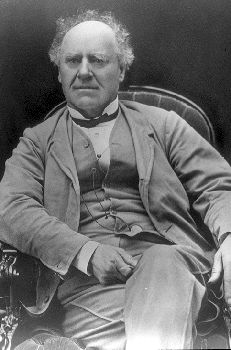
People
Birth of Joseph Howe
Nova Scotian patriot Joseph Howe was born in Halifax. He was influential in the achievement of responsible government in Nova Scotia.
-
June 01, 1813

People
Capture of USS Chesapeake
HMS Shannon defeated USS Chesapeake and towed the American vessel into Halifax, Nova Scotia. This victory reclaimed the honour of the Royal Navy, which had suffered from earlier defeats in ship-to-ship actions.
-
September 01, 1813
People
"Black Refugees" Set Sail
British Vice-Admiral Alexander Cochrane's offer of transportation for anyone wanting to leave the United States was widely circulated among the Black population. Four thousand former slaves deserted to the British side and were transported to the British colonies. About 2,000 refugees set sail for Nova Scotia from September 1813 to August 1816.
-
October 02, 1813
People
African Americans Arrive in Halifax
Freed by the Royal Navy, a group of 133 African Americans from Chesapeake Bay arrived in Halifax.
-
May 22, 1820

Sports and Culture
Dalhousie University Cornerstone
The cornerstone of Dalhousie University was laid in Halifax.
-
October 13, 1820
People
Birth of Sir John Dawson
Geologist Sir John Dawson, who was the first Canadian-born scientist of worldwide reputation, was born at Pictou, NS.
-
October 16, 1820
People
Cape Breton Island Rejoined
Cape Breton Island rejoined the colony of Nova Scotia.
-
January 01, 1823

People
NS Issues Coinage
Nova Scotia became the first colony to issue coinage.
-
March 30, 1832

People
Bank of Nova Scotia Incorporated
The Bank of Nova Scotia was incorporated.
-
February 13, 1833

Communication and Transportation
Royal William Launched
The ship Royal William completed its crossing of the Atlantic from Pictou, NS, to Gravesend, England. It was the first ship to cross the Atlantic under steam power.
-
March 03, 1835

People
Howe Acquitted of Libel
Joseph Howe was acquitted of libel for publishing an article in his newspaper, The Novascotian, critical of Halifax's magistrates. The trial marked a turning point in the history of reform politics in Nova Scotia.
-
January 21, 1839
Sports and Culture
Acadia College Opens
Acadia College opened at Wolfville, NS.
-
September 19, 1839
Communication and Transportation
Albion Mines Railway
A celebration marked the opening of the first 4 kilometers of the Albion Mines Railway in Pictou County, NS. It was the second steam railway in Canada, and the first to use standard gauge.
-
February 02, 1848
People
Responsible Government in Nova Scotia
James Boyle Uniake became leader of a new Reform government. Nova Scotia was thus the first colony in the British Empire in which responsible government was in effect. Responsible government meant that a colony enjoyed complete self-government in domestic affairs and that a government ruled only with the support of the majority of the elected Assembly (the origins of today's cabinet government).
-
April 07, 1851
People
Nova Scotia Women Disenfranchised
The Franchise Act disenfranchised women by adding the word male to voting requirements. There had been no specific restrictions on women’s right to vote since Nova Scotia had been granted a General Assembly in 1758.
-
June 26, 1854
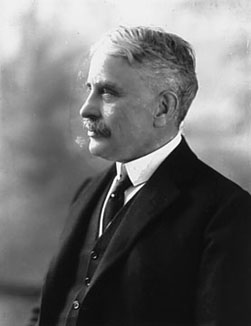
People
Birth of Sir Robert Borden
Prime Minister Sir Robert Borden, who headed the Canadian delegation to the Paris Peace Conference 1919, was born at Grand Pré, NS.
-
November 16, 1857

People
William Neilson Hall Receives Victoria Cross
William Hall served aboard the frigate Shannon in Calcutta during the 1857 Indian Mutiny. Against all odds, Hall breached a wall of the Najeef Temple to allow British troops to overcome the mutineers. He was awarded the Victoria Cross, the first Canadian naval recipient, the first Black and the first Nova Scotian to win the prestigious medal.
-
February 08, 1858
Communication and Transportation
Railway to Truro Opens
A railway opened from Halifax to Truro and Windsor in Nova Scotia.
-
July 17, 1860
Resources and Environment
Total Eclipse Obscured
An American expedition, including Nova Scotia-born astronomer Simon Newcomb, arrived in northern Manitoba to observe a total eclipse, but were thwarted by clouds on the crucial day.
-
January 03, 1863

Sports and Culture
First Covered Skating Rink
The first covered skating rink on the East Coast opened in Halifax.
-
February 20, 1864
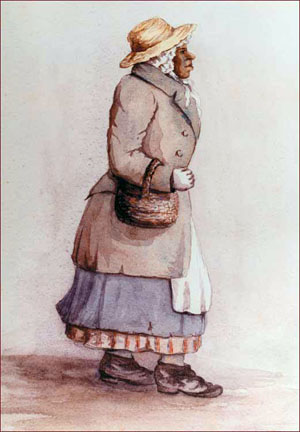
People
Death of Rose Fortune
Respected local figure and entrepreneur Rose Fortune, also considered Canada’s first female police officer, died at Annapolis Royal, NS. The daughter of Black Loyalists who moved to Annapolis Royal in 1784, Fortune built a successful cartage business that outlived her by a century. She certainly cut a figure in town, becoming Annapolis Royal’s (unofficial) police officer as she patrolled its streets and wharf.
-
December 04, 1866
People
London Conference
Sixteen delegates from the Province of Canada, Nova Scotia and New Brunswick met with the British government in London, England. During the three month conference, delegates reviewed the Québec Resolutions — creating a document that would form the basis of the British North America Act — chose "Canada" as the name of the new country and designated it a Dominion.
-
March 08, 1867
People
British North America Act
The British North America Act was passed by the British Parliament and given royal assent by Queen Victoria on 29 March. It came into effect on 1 July. The Act joined the colonies of Canada, Nova Scotia and New Brunswick in one federal union. In 1949, Newfoundland becomes Canada’s newest province. In 1999, Nunavut becomes Canada’s newest territory. Its creation establishes self-governance for the region’s Inuit population.
-
July 01, 1867

People
Canada Comes Into Existence
The Dominion of Canada came into existence, consisting of Ontario, Québec, Nova Scotia and New Brunswick.
-
October 04, 1869
Disasters
Saxby Gale Hits Bay of Fundy
The Saxby Gale, a hurricane in the Bay of Fundy that coincided with an unusually high tide, caused extensive damage along the coasts of New Brunswick and Nova Scotia. It flooded rivers and farmland, destroyed sections of railway, and caused over a hundred deaths. The cyclone may also have caused the formation of the isthmus that connects Partridge Island, NS, to the province’s mainland.
-
January 01, 1871

People
The Red Ensign in Canada
Soon after Confederation, Canadians began flying the Red Ensign with the quartered arms of Ontario, Québec, Nova Scotia and New Brunswick in the fly. As provinces joined Confederation, the arms of Canada increased in detail. By 1921 nine provinces had joined Confederation, and the shield was difficult to recognize, especially at sea.
-
April 01, 1873
Disasters
Wreck of the SS Atlantic
The passenger ship Atlantic, bound for New York, foundered on a reef off Peggy's Point, Nova Scotia. More than 500 people were killed.
-
May 13, 1873
Disasters
Mine Disaster at Westville
The first mine disaster occurred at Westville, NS. An explosion ripped through the tunnels, and two years passed before the last of the 60 bodies was recovered.
-
June 01, 1873

People
Death of Joseph Howe
Journalist and politician Joseph Howe died in Halifax. Disheartened with Nova Scotia’s government system, the reform-minded journalist entered politics in 1836. His confidence in responsible government helped Nova Scotia transition its system of governance without, said Howe, “a blow struck or a pane of glass broken.”
-
August 25, 1873

Disasters
Nova Scotia Cyclone
The deadliest storm ever to hit Canada struck the Maritimes, stranding or sinking over 1,000 ships, destroying bridges, wharves, homes and churches, and leaving 500 people dead.
-
October 27, 1874
Communication and Transportation
William D. Lawrence Launched
The William D. Lawrence, the largest wooden ship built in the Maritimes, was launched at Maitland, NS.
-
January 14, 1875
Communication and Transportation
Halifax Herald Established
The first issue of the Halifax Herald newspaper was published.
-
September 01, 1879
People
First Trade Union
The first trade union to be legalized in Canadian coal mines was the Provincial Workmen's Association, organized at Springhill, NS.
-
January 01, 1884
People
Municipal Vote Attempted for NS Unmarried Women
An attempt to secure the municipal vote for widowed and unmarried women property holders failed. The legislation included the possibility of serving on school boards. When the vote came to a tie, the speaker broke it in favour of the anti-franchisers. Another attempt to get the municipal vote was passed in 1887, though school board service was revoked.
-
January 01, 1885
Indigenous Peoples
Status Indians Enfranchised in Nova Scotia
Federal legislation put forward by Sir John A. Macdonald extended voting rights to Status Indians in eastern Canada who met existing property requirements. The federal legislation was repealed in 1898, but, unlike other provinces, Nova Scotia did not subsequently enact laws disqualifying Status Indians from voting provincially.
-
March 04, 1886

Sports and Culture
Birth of Sam Langford
Boxer Sam Langford was born at Weymouth Falls, NS.
-
November 23, 1887
Communication and Transportation
Launch of the L’Évangéline
Established by Valentin Landry in Digby, Nova Scotia, this Acadian newspaper was moved to Moncton, New Brunswick in 1905 and published until 1982.
-
December 08, 1887
People
Birth of John Craigie
Plant pathologist John Craigie, who discovered the sexual process in rust diseases of wheat, was born at Merigomish, NS.
-
May 30, 1890
People
Birth of John Stuart Foster
John Stuart Foster, a physicist who made important contributions to the study of the "Stark effect," was born at Clarence, NS.
-
June 27, 1890

Sports and Culture
George Dixon Wins Championship
Nova Scotian George Dixon won the world bantamweight boxing crown.
-
September 01, 1890
Sports and Culture
College Sainte-Anne, NS is founded
College Sainte Anne (today Université Sainte-Anne) was founded at Church Point, Nova Scotia by the Eudist Fathers and offered instruction in French.
-
February 21, 1891
Disasters
Springhill Mine Disaster, 1891
One hundred and twenty-five miners were killed in a coal mine disaster in Springhill, NS.
-
March 01, 1895
People
Halifax Suffrage Association Established
The Halifax Suffrage Association (HSA) was established with Anna Leonowens, an author and feminist, as its first president. Leonowens would become one the region’s most visible leaders in the women’s rights movement. The HSA leadership included Eliza Ritchie, who was Nova Scotia’s first female professor, and community leader Charlotte McNeill.
-
April 24, 1895

Sports and Culture
Slocum Sails Around World
Nova Scotia-born Joshua Slocum set out in his small boat Spray from Boston, Mass, on his voyage around the world. He completed his journey on 27 June 1898, making him the first man to sail around the world alone.
-
September 05, 1899
Sports and Culture
Birth of Mary Creighton
Song collector and folklorist Mary Creighton, who was a pioneer collector of folk music of the Maritimes, was born at Dartmouth, NS.
-
December 15, 1902
Communication and Transportation
First Transatlantic Radio Report
The first transatlantic radio press report was filed from Glace Bay, NS, by a Times correspondent.
-
July 22, 1904
People
Birth of Donald Hebb
Psychologist Donald Hebb, whose studies of development showed the importance of environmental stimulation in early childhood, was born at Chester, NS.
-
March 20, 1907

Sports and Culture
Birth of Hugh MacLennan
Novelist Hugh MacLennan was born at Glace Bay, NS. MacLennan won the Governor General's Literary Award five times -- more than any other Canadian author.
-
February 23, 1909

Communication and Transportation
Silver Dart Flies
John Alexander Douglas McCurdy (1886-1961) flew the aircraft the Silver Dart for about one kilometer at Baddeck, NS. It was the first powered flight of a heavier-than-air machine in Canada and the British Empire.
-
January 27, 1911
People
Birth of Blanche Meagher
Blanche Margaret Meagher, one of the pioneering women in the Department of External Affairs, was born at Halifax, NS.
-
May 09, 1914
Sports and Culture
Birth of Hank Snow
Hank Snow, influential pioneer of country and western music, was born in Brooklyn, NS.
-
July 06, 1914

People
Birth of Viola Desmond
Viola Irene Desmond (née Davis), businesswoman and civil libertarian, was born in Halifax, NS. After a 1946 incident in which Desmond was arrested for sitting in a “Whites Only” section of a theatre in New Glasgow, NS, she fought her conviction of defrauding the government of the difference in tax — one cent — between tickets in the racially-separated sections. Though the conviction was upheld, her struggle became a catalyst for change. Desmond was pardoned by Nova Scotia Lieutenant-Governor Mayann Francis in 2010.
-
September 19, 1914
People
Margaret MacDonald Volunteers for Service
Nova Scotian nurse Margaret MacDonald volunteered for overseas service in the First World War. She began to enlist others to serve in Europe. MacDonald was the first woman in the British Empire to achieve the rank of major.
-
September 15, 1916
People
Canadians Take Courcelette
The 22nd Battalion from Québec, the 25th from Nova Scotia, and the 26th from New Brunswick captured Courcelette and took over 1,000 prisoners.
-
December 06, 1917
Disasters
Halifax Explosion
At Halifax, the French munitions ship Mont Blanc collided with the Belgian relief ship Imo. The resulting explosion, the largest before the advent of the atomic bomb, killed more than 1,600 people and injured 9,000 in Canada's worst disaster.
-
January 23, 1918
Disasters
Stellarton Mine Disaster
Eighty-eight men died in a mine explosion in the Allan Shaft at Stellarton, NS.
-
January 31, 1918
People
First Annual Meeting of NS Equal Franchise League
The Nova Scotia Equal Franchise League held its first, and last, annual meeting. Both women and men joined the league, which provided information for any group interested. The Halifax Explosion of December 1917 so impacted its membership that the League decided its resources were better used in aiding the victims.
-
March 26, 1921
Sports and Culture
Bluenose Launched
The schooner Bluenose was launched at Lunenburg, Nova Scotia.
-
January 01, 1928
People
Pier 21 Opens
Pier 21 opened in Halifax, NS. The point of entry for some one million immigrants into Canada — and the point of departure for nearly 500,000 soldiers in the Second World War — it has often been called the “Gateway to Canada." Today it is a national historic site and museum.
-
January 01, 1936

Resources and Environment
Cape Breton Highlands National Park Established
Cape Breton Highlands National Park was established. The park stretches across the northern tip of Cape Breton Island, occupying
948 km2 of a high plateau dotted with ponds and covered with bogs and forest. This is one of the places claimed as the site of John Cabot's landfall in 1497. -
June 20, 1945

Sports and Culture
Birth of Anne Murray
Anne Murray, whose renditions of songs such as "Snowbird" made her one of the first Canadian popular musicians to enjoy international fame, was born in Springhill, NS.
-
July 18, 1945
Disasters
Bedford Magazine Explosion
An ammunition barge blew up at the naval magazine jetty on Bedford Basin, Halifax harbour. A chain reaction of fire, explosion and concussion rocked Halifax for a day.
-
January 31, 1946
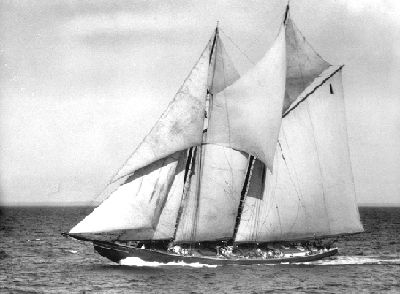
Sports and Culture
Bluenose Sinks
The once-famous schooner Bluenose hit a reef and sank off the coast of Haiti. The crew of 8 men was rescued.
-
February 18, 1946

People
Birth of Mayann Francis
Mayann Francis, the first Black lieutenant-governor of Nova Scotia, was born at Sydney, NS. Francis worked in a variety of senior public service positions, including director and chief executive officer of the Nova Scotia Human Rights Commission from 1999 to 2006, and she was the first female provincial ombudsman from 2000 to 2003. She was named lieutenant-governor in 2006.
-
January 01, 1949
Indigenous Peoples
First Nations Win Right to Vote Provincially
Except in Nova Scotia and Newfoundland, Status Indians had been barred from voting provincially. Beginning with British Columbia in 1949 and ending with Quebec in 1969, First Nations peoples gradually win the right to vote in provincial elections without losing status or treaty rights.
-
March 04, 1949

Sports and Culture
Birth of Carroll Baker
Country singer Carroll Baker was born at Bridgewater, NS.
-
April 02, 1955

Communication and Transportation
Bridge Links Halifax and Dartmouth
The Angus L. Macdonald Bridge linking Halifax and Dartmouth opened.
-
October 30, 1956

People
Conservatives Win Nova Scotia
The Conservatives under Robert Lorne Stanfield won the Nova Scotia election.
-
November 01, 1956
Disasters
Springhill Mine Disaster, 1956
A mine disaster at Springhill, NS, killed 39 men. Another 88 trapped men were later rescued.
-
February 12, 1960
Sports and Culture
Birth of George Elliott Clarke
George Elliott Clarke, poet, playwright and professor, was born at Windsor Plains, NS. A prolific and award-winning writer, Clarke is a strong voice for the Black community in Canada. Clarke’s work explores the roots of both racism and diversity in Canada. His term, “Africadia,” encapsulates the fluid, intermixed and checkered history of his home province.
-
June 07, 1960
People
First Woman Elected to the Nova Scotia Legislature
Gladys Porter became the first woman elected to the Nova Scotia legislature.
-
January 01, 1964
People
Africville Demolished
Encouraged by media attention to Africville's "American-style ghetto," the Halifax City Planning Commission expropriated the land. Residents resisted, citing the community's proud traditions, although Africville lacked basic services such as water, sewage, and good roads. Between 1964 and 1970 residents were relocated and the community razed.
-
February 07, 1965

People
Death of Viola Desmond
Viola Desmond, who helped galvanize Black Canadians against segregation, died at New York City. After a 1946 incident in which Desmond was arrested for sitting in a “Whites Only” section of a theatre in New Glasgow, NS, she fought her conviction of defrauding the government of the difference in tax — one cent — between tickets in the racially-separated sections. Though the conviction was upheld, her struggle became a catalyst for change. In 2010, Desmond was pardoned by Nova Scotia Lieutenant-Governor Mayann Francis.
-
September 09, 1967

People
Stanfield Chosen Leader
Robert Stanfield, premier of Nova Scotia, was elected leader of the national Progressive Conservative Party at a Toronto convention.
-
January 28, 1968

Sports and Culture
Birth of Sarah McLachlan
Singer Sarah McLachlan was born at Halifax, NS.
-
February 04, 1970
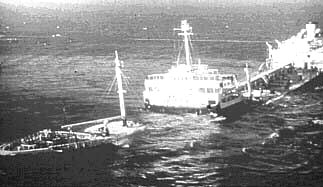
Disasters
Arrow Runs Aground
The Liberian-registered tanker Arrow ran aground on Cerebus Rock in Chedabucto Bay, NS, spilling 10,500 metric tons of oil onto the water and beaches and causing catastrophic environmental damage.
-
March 07, 1970

Resources and Environment
Total Eclipse of the Sun
A total eclipse of the sun cast a shadow 160 kilometers wide along Canada's Atlantic coast, sweeping the length of Nova Scotia and across Newfoundland.
-
March 08, 1971
People
Pier 21 Closes
Forty-three years after its official opening, Pier 21 was closed. A gateway to Canada, one in five Canadians has a connection to Pier 21, in Halifax, NS. Roughly one million immigrants passed through its doors between 1928 and 1971.
-
July 29, 1971

Sports and Culture
Bluenose II Presented
The Oland family presented the Bluenose II to the province of Nova Scotia as a floating maritime museum.
-
August 16, 1971
Disasters
Hurricane Beth
Hurricane Beth hit Nova Scotia, dumping 296 mm of rain.
-
October 04, 1971
Resources and Environment
Oil Discovered on Sable Island
Oil and natural gas were discovered on Sable Island.
-
December 22, 1972
Resources and Environment
Whaling Moratorium
The federal government ordered a halt to all whaling operations based out of Canadian ports. The last West Coast company had stopped whaling in 1967, so the order affected only two shore-based operations in Newfoundland and one in Nova Scotia. The Inuit are still allowed to harvest whales as part of their traditional rights.
-
February 04, 1976
Sports and Culture
Ruling on Censorship in NS
The Supreme Court of Nova Scotia ruled that the province did not have the right to censor motion pictures.
-
January 01, 1980
Sports and Culture
Atwood Co-Published Anna's Pet
Margaret Atwood co-published another children's book, Anna's Pet, with Joyce Barkhouse. In 1986 it was adapted for stage by Nova Scotia's Mermaid Theatre.
-
January 01, 1984
People
Nova Scotian Civil Rights Advocate Awarded Order of Canada
Dr. William Pearly Oliver and his wife Pearleen Borden Oliver helped unite the Black community in the 1940s and 1950s. William, founder of the Nova Scotia Association for the Advancement of Coloured People (NSAACP), received the Order of Canada in 1984. Pearleen received an Honorary Doctorate from Saint Mary's University in 1990.
-
January 01, 1984
People
Lewis Elected Mayor of Annapolis Royal
Daurene Lewis, a descendant of Black Loyalists, was elected Mayor of the Nova Scotia town of Annapolis Royal and became the first Black female mayor in North America.
-
January 01, 1991
People
Race Riot at NS High School Prompts Education Reform
A fight between one Black and one White student at Cole Harbour District High School escalated into a brawl involving 50 youths of both races. The event mobilized provincial Black activists around the issue of unequal educational opportunities. Nova Scotia's Ministry of Education established a fund in 1995 to improve education and support anti-racist initiatives.
-
May 09, 1992

Disasters
Westray Mine Disaster
Twenty-six miners were killed at Plymouth, NS, when a blast triggered by the ignition of stray methane led to a chain reaction of lethal methane and coal-dust explosions.
-
March 15, 1995
People
Gerald Regan Charged
Former premier of Nova Scotia Gerald Regan was charged with 16 counts of sex crimes.
-
July 22, 1996

Disasters
Westray Responsibility
The Nova Scotia government acknowledged responsibility for the 1992 explosion at the Westray mine in Plymouth, NS. Former premier Donald Cameron had blamed the miners.
-
July 18, 1997
People
MacLellan Becomes PM of NS
Russell MacLellan was sworn in as Nova Scotia's premier.
-
September 01, 1997
Indigenous Peoples
Mi’kmaq Education Agreement
The Mi’kmaq Education Agreement took effect in Nova Scotia. The Agreement was Canada’s first self-government arrangement that included sectorial educational protocols. It gave eleven Mi’kmaq communities control over their education systems. Since the transition, completion rates have vastly improved and have become among the highest for on-reserve students in Canada.
-
December 01, 1997

Disasters
Westray Report Issued
Justice Peter Richard of NS issued a report on the Westray mine disaster that cited slipshod government inspection and the mine management's disregard for safety as being responsible for the explosion.
-
March 24, 1998
People
Yvonne Atwell Elected to NS Legislative Assembly
Yvonne Atwell, community development advocate and president of the African Canadian Caucus of Nova Scotia, became the first Black Nova Scotian woman elected to the Nova Scotia Legislative Assembly.
-
September 02, 1998
Disasters
Swissair Flight Crashes
Swissair Flight 111 en route from New York to Geneva crashed off Peggy's Cove, NS, killing all 229 people on board.
-
July 01, 1999

Sports and Culture
Canadian Museum of Immigration Opens
The Canadian Museum of Immigration at Pier 21, one of Halifax’s most popular historic sites, opened. The museum tells the story of the Pier, the people who passed through it, and the lives they went on to live.
-
July 27, 1999

People
PC Party Wins NS Majority
The Nova Scotia Conservative Party won a majority of seats in the House of Assembly. Tory leader John Hamm became premier, succeeding Russell MacLellan.
-
September 17, 1999
Indigenous Peoples
Mi'kmaq Fishing Rights Upheld
The Supreme Court of Canada ruled that treaties from the 1760s guaranteed Mi'kmaq rights to fish, hunt and log year round. The ruling sparked controversy, as the Mi'kmaq began to fish lobster out of season. Angry non-Indigenous fishermen destroyed lobster traps and other equipment, sunk a boat and carried out an armed blockade of Yarmouth Harbour, NS. The conflict ended when an agreement was reached that allowed the Mi’kmaq to fish for subsistence only.
-
November 17, 1999
Indigenous Peoples
Mi'kmaq Rights Clarified
The Supreme Court of Canada clarified its earlier ruling (September 17) regarding Mi'kmaq (Micmac) fishing rights, stating that the ruling had been misinterpreted. It stated that the ruling applied did not guarantee open season on fishing.
-
December 20, 1999
Sports and Culture
Death of Hank Snow
Nova Scotia-born country singer and songwriter Hank Snow died in Madison, Tennessee. During his lifetime he recorded more than 80 albums and 2,000 songs.
-
December 31, 1999
Resources and Environment
Sable Island Gas Flows
The construction of three offshore platforms off Sable Island was completed and the first natural gas began to flow through a submarine pipeline to mainland Nova Scotia.
-
June 09, 2009
People
NDP Wins in NS
Darrell Dexter led the NDP to a win in Nova Scotia, forming the first NDP government in Atlantic Canada.
-
June 19, 2009
People
Dexter Becomes Premier
NDP leader Darrell Dexter was sworn in as Nova Scotia's 27th premier.
-
February 28, 2010

Sports and Culture
Men's Hockey Team Wins Olympic Gold
The Canadian men's hockey team won the Olympic gold medal at the Vancouver Winter Olympics, defeating the US 3-2 in overtime when centre Sidney Crosby, assisted by Jarome Iginla, scored against the US. Crosby's goal is considered one of the greatest in the history of Canadian hockey.
-
April 16, 2013
Sports and Culture
Death of Rita MacNeil
Cape Breton's "first lady of song," Rita MacNeil, died at age 68 following complications from surgery.
-
July 16, 2013

Sports and Culture
Death of Alex Colville
Renowned artist Alex Colville died at Wolfville, NS, at 92. Colville's work balanced the everyday and the extraordinary. He had been a prominent figure on the Canadian art scene since the Second World War, during which he served as a war artist. He was perhaps best-known for his meticulous depictions of common scenes in everyday life.
-
July 29, 2013
People
Death of Burnley Allan "Rocky" Jones
Social activist on matters of human rights, race and poverty, Burnley Allan Jones died in Halifax, Nova Scotia. As a prominent attorney in Halifax, Jones was committed to human rights, criminal and prisoners' rights and labour law. He was a founding member of the Black United Front in Nova Scotia and he played a key role in creating a program for Black and Mi'kmaq persons at the Dalhousie Law School.
-
May 23, 2016

People
Death of John Brophy
Hockey coach John Brophy, who led the Toronto Maple Leafs for two and a half seasons in the late 1980s, died in his hometown of Antigonish, Nova Scotia. He was 83. Though the Leafs’ performance during Brophy’s tenure was not the finest of its history, Brophy left his mark on several hockey leagues as a hard-nosed player and coach. He ranks second only to Scotty Bowman in professional coaching victories and holds the Eastern Hockey League record for penalty minutes.
-
May 02, 2017
People
Death of Paul MacEwan
Paul MacEwan, former Member of the Legislative Assembly of Nova Scotia, died at the age of 74. He served in the Nova Scotian parliament for 33 years continuously (1970–2003).
-
June 11, 2017

Sports and Culture
Crosby's Second Consecutive Stanley Cup and Conn Smyth Trophy
Sidney Crosby led the Pittsburgh Penguins to a second consecutive Stanley Cup win and received the Conn Smythe Trophy for the second year in a row. Crosby became the third player to win the award in back-to-back years, after Bernie Parent (1974, 1975) and Mario Lemieux (1991, 1992).
-
September 12, 2017
People
Death of Allan MacEachern
Former Liberal Cabinet minister Allan MacEachern, of Cape Breton, Nova Scotia, died in Antigonish at age 96. An influential parliamentarian who played a key role in passing health-care and labour legislation that helped shape modern Canadian society, MacEachern is also remembered for his contributions to Atlantic Canada and his devotion to his constituents in Inverness. He was appointed an Officer of the Order of Canada in 2008.
-
April 18, 2020

Disasters
Nova Scotia Attacks
Beginning at his home in Portapique, Nova Scotia, a man wearing an RCMP uniform and driving a replica police cruiser went on a 13-hour rampage that left 22 people dead and six injured. It was the worst mass killing in modern Canadian history. Concerns were later raised regarding the RCMP’s response to the events and its handling of the manhunt. The federal and Nova Scotia governments later launched a public inquiry into the events.
-
August 17, 2021
People
Progressive Conservatives Score Upset Victory in Nova Scotia Election
Tim Houston led the Progressive Conservatives to an upset victory over the governing Liberals. The PCs took 38.44 per cent of the popular vote and increased their seat total in the 55-seat legislature from 17 to 31. The party took advantage of early campaign stumbles by the Liberals while tacking hard to the left, promising $553 million in health care spending. It was the sixth provincial or territorial election in Canada since the start of the COVID-19 pandemic and the first in which the incumbent party lost.




